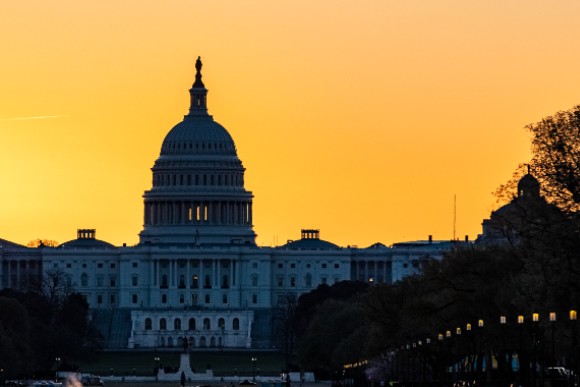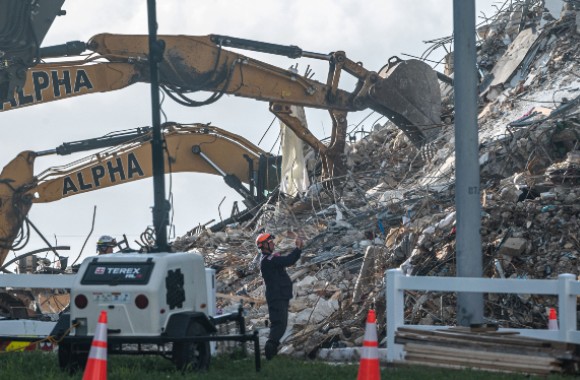The Hill’s Morning Report – Infrastructure deal back on track; Biden orders airstrikes against Iran-backed militia

Welcome to The Hill’s Morning Report. It is Monday! We get you up to speed on the most important developments in politics and policy, plus trends to watch. Alexis Simendinger and Al Weaver are the co-creators. Readers can find us on Twitter @asimendinger and @alweaver22. Please recommend the Morning Report to friends and let us know what you think. CLICK HERE to subscribe!
Total U.S. coronavirus deaths: 603,967.
As of this morning, 54 percent of the U.S. population has received at least one dose of a COVID-19 vaccine and 46.1 percent is fully vaccinated, according to the Bloomberg News global vaccine tracker.
President Biden needed some major PR rescuing after Thursday, when he tried to hail a bipartisan infrastructure deal while simultaneously threatening to veto it if Democrats’ priorities, largely plucked out of the $1.2 trillion accord because of GOP objections, don’t come to his desk “in tandem” months from now, when a separate, Democratic measure is ready.
By Sunday morning, the blast furnace from Republicans following Biden’s remarks had cooled. The president will travel to La Crosse, Wis., on Tuesday to begin touting the merits of the bipartisan framework in select locations that could benefit from infrastructure investments.
Biden’s comments on Thursday potentially prolonged a legislative slugfest that is likely to drag into the fall and the midterm contests, rattled trust on both sides of the aisle, and countered Biden’s own narrative that he’s a master deal-maker and salesman. The implied message to constituents: Don’t expect enactment in Washington anytime soon.
The Wall Street Journal: White House, Senate negotiators try to keep infrastructure deal alive.
Late on Sunday, Washington’s focus on infrastructure was briefly interrupted by news that Biden ordered “defensive” airstrikes to hit weapons storage facilities used by Iran-backed militia in response to drone attacks against U.S. personnel and facilities in Iraq (ABC News). The president returned to the White House from Camp David on Sunday evening but did not respond to reporters’ questions about the action, which was announced by the Pentagon. The airstrikes took place Monday in Iraq and Syria, and the Iran-backed Iraqi factions vowed revenge (The Associated Press). Defense Secretary Lloyd Austin and Gen. Mark Milley, the chairman of the Joint Chiefs of Staff, briefed Biden on attack options early last week, and the president approved striking three targets (The New York Times).
Over the weekend, the president appeared to be focused on rescuing his domestic agenda, issuing an unusually detailed written statement. “My comments … created the impression that I was issuing a veto threat on the very plan I had just agreed to, which was certainly not my intent,” he said (The Hill). The mop-up effort involved phone calls by Biden to lawmakers.
Republican senators who favor enactment of a compromise measure said Sunday they trust Biden’s word. The outline put together by 11 Republicans, nine Democrats and one Independent appeared to be back on track (The Washington Post).
The Hill’s Sunday show roundup: A trio of Republican senators said they accept Biden‘s clarified remarks.
But what about Democrats? Senate Budget Committee Chairman Bernie Sanders (I-Vt.), who backs spending $6 trillion for Democratic priorities, lost no time before saying last week that a bipartisan infrastructure bill goes nowhere without “firm, absolute agreement” on the reconciliation bill he and other colleagues have in mind, which includes tax hikes (The Hill). Rep. Alexandria Ocasio-Cortez (D-N.Y.) urged Biden on Sunday not to be “limited by Republicans” (NBC News).
Speaker Nancy Pelosi (D-Calif.) remained silent over the weekend, but she faces questions this week. On Thursday, she vowed there would be no vote on infrastructure without Senate action on a reconciliation bill (The Hill). “Let me be really clear on this,” she said in the Capitol. “We will not take up a bill in the House until the Senate passes the bipartisan bill and a reconciliation bill. If there is no bipartisan bill, then we’ll just go when the Senate passes a reconciliation bill.”
As the week begins with the Senate out of Washington until after the Fourth of July, Democrats are so divided about their aims and strategies that the toughest negotiations ahead for Biden will be among members of his own party, reports The Hill’s Jordain Carney.
Senate Majority Leader Charles Schumer (D-N.Y.) bluntly laid out the risk: If Democrats can’t navigate the policy and political minefields and a two-track legislative strategy, they could end up with nothing.
“If we don’t have an agreement on both, we’re not going to have the votes for either. Plain and simple,” Schumer said.
More in Congress: Former Alaska Sen. Mike Gravel (D), died at age 91 on Saturday. He served in the Senate from 1969 to 1981 (The Associated Press). … Sen. Joe Manchin (D-W.Va.) continued on Sunday to defend his centrist perspectives (The Hill). … Democratic congressional aides and political analysts argue that Sen. Kyrsten Sinema (D-Ariz.) should recognize and be reassured that transformative legislation resulted in recent years from reconciliation measures that bypassed the 60-vote filibuster (The Hill).

LEADING THE DAY
POLITICS: If there was any doubt that former President Trump is a turbulent weather front that never clears, there were more clouds over the weekend with the start of a rally schedule, an anticipated criminal indictment this week and new details about the Trump presidency disclosed in yet more books.
Manhattan prosecutors gave the Trump Organization until this afternoon to state why criminal charges should not be brought regarding the company’s handling of employee perks and finances (The Washington Post).
Trump’s “Save America” travel schedule brought him to Ohio on Saturday (pictured below) and will put him in Sarasota, Fla., along with a fireworks display, on July 3. (Sarasota Magazine). The former president is eager to fortify his position as leader of the Republican Party while returning to his popular rally format, and he is intent on defeating Republican candidates he sees as his foes (The Hill). Sen. Rob Portman (R-Ohio), who is retiring next year, on Sunday joined a chorus of his colleagues to publicly declare Trump the party’s leader (The Hill).
And, in pending books and newly released interviews, we learn why former Attorney General William Barr publicly torpedoed Trump’s claims of widespread election fraud last year after widely being seen as Trump’s loyal defender. Barr says he was repeatedly urged by then-Senate Majority Leader Mitch McConnell (R-Ky.) to speak out ahead of the Georgia Senate special elections in January (which Democrats subsequently won), and Barr now says he had privately expected Trump to lose the election. “My attitude was: It was put-up or shut-up time,” Barr told ABC News journalist Jonathan Karl, author of the book “Betrayal.” “If there was evidence of fraud, I had no motive to suppress it. But my suspicion all the way along was that there was nothing there. It was all bullshit” (The Atlantic). (On Sunday, Trump released an eight-paragraph statement denouncing Barr without denying his account.)
Out this week from Harper Collins and Washington Post journalists Yasmeen Abutaleb and Damian Paletta is the book “Nightmare Scenario: Inside the Trump Administration’s Response to the Pandemic That Changed History.” In it, the former president in February 2020 mused about sending some Americans infected with COVID-19 to Guantanamo Bay for quarantine (The Hill).
Trump’s role in the Jan. 6 attack on the Capitol is a centerpiece of Democrats’ determination to get an investigation of the events moving this year. As The Hill’s Mike Lillis and Scott Wong report, the House select committee probe announced by Pelosi last week will likely spill into 2022 — when midterm elections put the House majority up for grabs.

More in politics: Cybersecurity threats have forced political campaign organizations to ramp up their protections against ransomware and cyber breaches (The Hill). … Former Democratic presidential nominee Michael Dukakis, 87, has some advice for his party about the political potency of crime as a campaign issue, in an interview with The Hill’s Niall Stanage. … Deceptive campaign fundraising techniques often ensnare older people (The New York Times). … Republicans are watching their states back marijuana, and they’re not sold (Politico).
IN FOCUS/SHARP TAKES
ADMINISTRATION: The White House says it will evacuate from Afghanistan to third countries former interpreters, drivers and others along with their families, a way to remove them from danger, including risks from some Taliban fighters (pictured below). Those given an exit ramp from Afghanistan must complete what can be a years-long process of reviewing applications for so-called special immigrant visas (SIVs). Lawmakers and advocates reacted by saying the administration left many questions unanswered as it prepares to pull out as many as 70,000 people under an escalating withdrawal timeline (The Hill).

> U.S.-Israel: Secretary of State Antony Blinken and Israeli Foreign Minister Yair Lapid met Sunday in Rome for a diplomatic session aimed at resetting relations in the post-Netanyahu and post-Trump era (The Associated Press). “In the past few years, mistakes were made,” Lapid told Blinken. “Israel’s bipartisan standing was hurt. We will fix those mistakes together.”
> LGBT advocates say there is more work to be done by both the president and Congress to help the community, especially when it comes to transgender individuals (The Hill).
> Vaccine passports: The Biden administration has remained hands off about decisions by private employers to impose vaccine mandates or require proof of COVID-19 vaccinations from employees or even customers. Some public health authorities want the administration to support mandates and vaccine passports and get involved in a debate that blends science, commerce, worker and employer rights, psychology and politics (The Hill).
> Food and Drug Administration: Can the Food and Drug Administration move faster to fully approve the COVID-19 vaccines? Does it want to? Some public health experts believe hesitancy to get COVID-19 inoculations amid the delta variant could beneficially ease if Americans were able to get jabs that were no longer experimental (The Hill).
The Morning Report is created by journalists Alexis Simendinger and Al Weaver. We want to hear from you! Email: asimendinger@digital-stage.thehill.com and aweaver@digital-stage.thehill.com. We invite you to share The Hill’s reporting and newsletters, and encourage others to SUBSCRIBE!
OPINION
Progressives can only win one kind of election, by Matthew Yglesias, Bloomberg Opinion. https://bloom.bg/3jiI8Rf
What I saw in my first 10 years on testosterone, by Thomas Page McBee, opinion contributor, The New York Times. https://nyti.ms/2UHItTo
WHERE AND WHEN
The House meets at noon.
The Senate convenes for a pro forma session at 9 a.m.; senators are out of Washington through July 9.
The president receives the President’s Daily Brief at 9:50 a.m. Biden welcomes Israeli President Reuven Rivlin to the Oval Office at 4 p.m.
Vice President Harris postponed a planned trip today to Detroit. She will depart Los Angeles at 1:30 p.m. local time to return to Washington.
Blinken has a full schedule in Rome today. He tours the Sistine Chapel at the Vatican. He will have an audience with Pope Francis and hold a joint press conference with Italian Foreign Minister Luigi DiMaio. Blinken will participate in bilateral discussions about Syria and later meet with Italian Prime Minister Mario Draghi. Later this week, Blinken will join international counterparts at the Group of 20 foreign affairs ministers meeting in Matera, Italy.
The White House press briefing is scheduled at 12:30 p.m.
INVITATION TUESDAY to The Hill’s Virtually Live event, “The Future of Missile Defense,” which begins at 12:30 p.m. Speakers include Rep. Jim Cooper (D-Tenn.), House Strategic Forces Subcommittee chairman, and Rep. Michael Turner (R-Ohio), the subcommittee ranking member; John Hill, director of the U.S. Defense Department Missile Defense Agency; and Gen. (ret.) Lori Anderson, former commander of U.S. Northern Command and North American Aerospace Defense Command. Information is HERE.
Hill.TV’s “Rising” program features news and interviews at http://digital-stage.thehill.com/hilltv or on YouTube at 10:30 a.m. ET at Rising on YouTube.
ELSEWHERE
➔ MIAMI TRAGEDY: Search efforts are continuing at the site of the partial collapse of a 12-story, oceanfront condo tower built in 1981. At least nine people are confirmed dead and more than 150 are reported missing. A fire beneath the rubble has been contained, and rescue workers created an enormous trench in the rubble to assist the search efforts. The condo building was in need of at least $9 million in repairs, according to 2018 engineering firm emails released by Surfside, Fla. (The Associated Press), and there is growing evidence that the partial collapse began with structural failure at the bottom of the building, likely at the pool deck level (Miami Herald). It is unclear if any of the damage observed by residents and reported by engineering firms in recent years was responsible for the destruction of Champlain Towers South. The building’s rapid pancaking early Thursday and documented need for repairs have also raised questions about whether other similar buildings in Miami are in danger. Searchers over the weekend began informing relatives about finding body parts in the rubble, explaining the process of DNA identification and the work conducted by the medical examiner (CNN). Surfside Mayor Charles Burkett on Sunday told ABC News, “We don’t have a resource problem. We’ve had a luck problem. We just need to start to get a little more lucky right now.”
In a written statement Sunday night after being briefed by phone from Miami by Federal Emergency Management Agency Director Deanne Criswell, Biden said, “This is an unimaginably difficult time for the families enduring this tragedy. For those who are waiting in anguish for word of their loved ones as search and rescue efforts continue …, the pain of the uncertainty is an added, heartbreaking burden. My heart goes out to every single person suffering during this awful moment.”

➔ SUPREME COURT: Justice Stephen Breyer has given no sign that he plans to retire as the court wraps up its term (expected this week), but his silence has not stopped some court observers from searching for clues in the flurry of end-of-term decisions. The 82-year-old faces intense pressure to allow Biden to select a younger replacement while Democrats still have control of the Senate (The Hill). … One court watcher, Harvard law professor Randall Kennedy, predicts Breyer will submit his resignation to Biden and that a former clerk for Breyer will win confirmation to his seat (The American Prospect).
➔ STATE & CITY WATCH: At least three big-city mayors are quitting before their terms are up, and others have said they have seriously contemplated getting out early. Governing during a pandemic has been tough, reports The Hill’s Reid Wilson. … Baltimore experienced two earthquakes over three days (The Hill). … Record high temperatures are wilting Oregon and Washington state (Los Angeles Times and The New York Times). Biden will hold a White House meeting among Cabinet secretaries, governors and stakeholders to discuss the wildfire and other risks. … The next phase of the 17-year cicada invasion is about to begin: hatching of nymphs from trillions of eggs laid in trees happens over the next few weeks (WLWT).
THE CLOSER
And finally … A rejuvenation clock sounds like science fiction or a thriller movie about immortality. But in a new study, scientists describe evidence that may explain how eggs and sperm meet and form an embryo that resets aging. The biological clock embedded in mice and human cells appears to reset at zero soon after fertilization (Science News).
The study is a first step and “poses more questions than answers, which is great,” says Vittorio Sebastiano, a developmental biologist at Stanford University School of Medicine who was not involved in the study.
Some questions: What mechanism pushes cells to reset their age? Are there specific genes that drive the process? Do all living things rejuvenate in this way?

✅ Separately, our apologies for missing reader John Dziennik Jr., who aced Thursday’s Morning Report Quiz but whose response was missed in Friday’s list of winners. A big round of applause!
Copyright 2023 Nexstar Media Inc. All rights reserved. This material may not be published, broadcast, rewritten, or redistributed. Regular the hill posts







